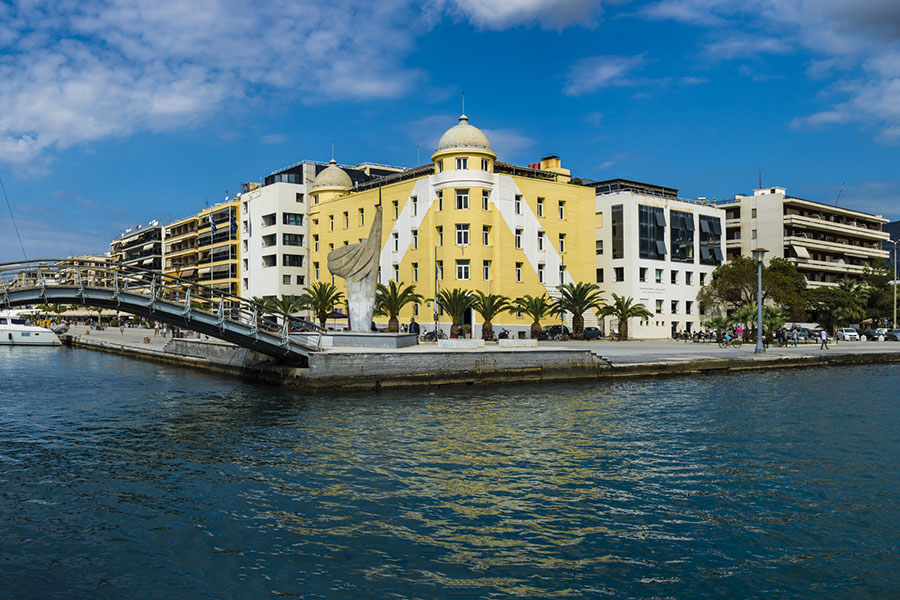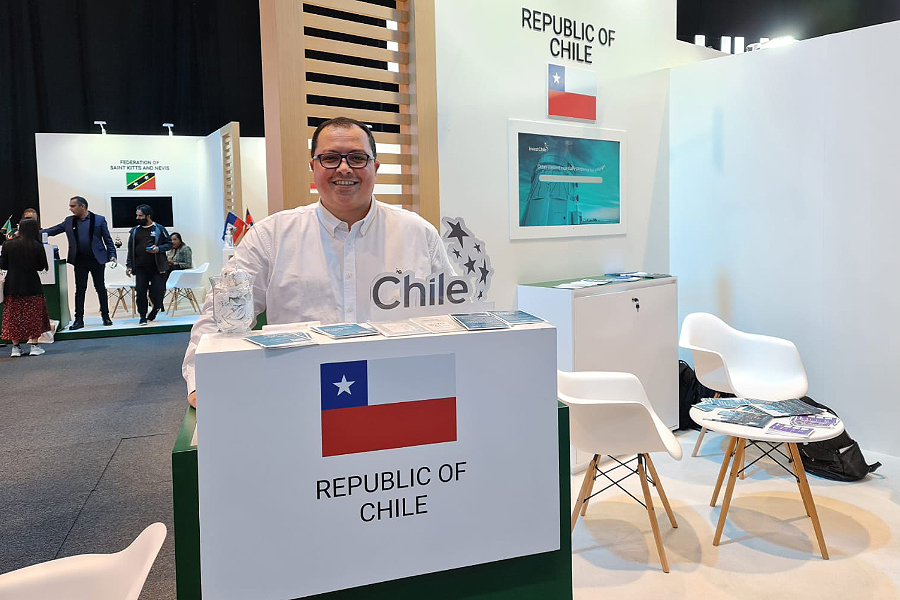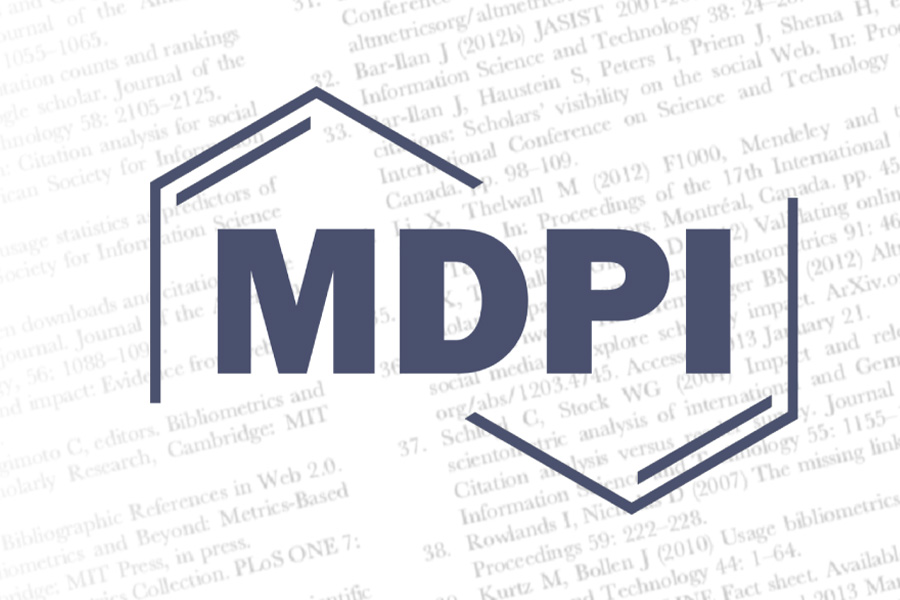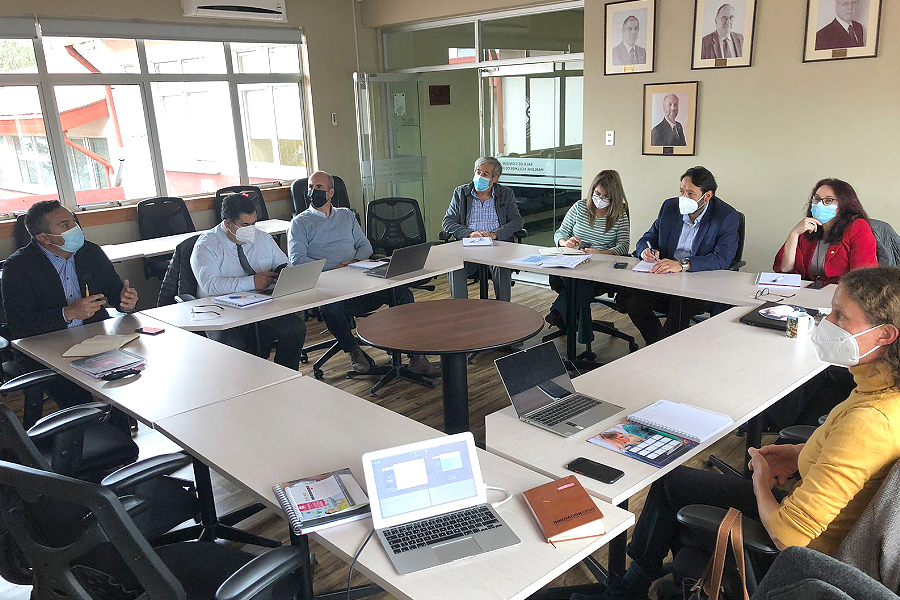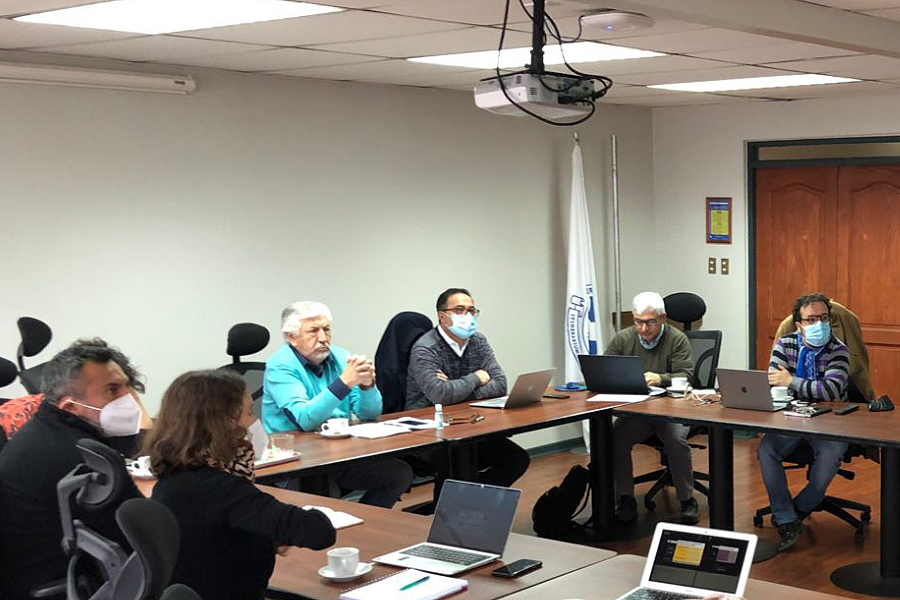|
This agreement will allow to exchange knowledge, as well as to carry out student and academic exchanges between both universities. |
The Department of Forestry Science of the Faculty of Agricultural and Forestry Science of the Universidad de La Frontera (UFRO) signed a cooperation agreement with the Department of Forestry, Wood Sciences and Design (DEXYS) of the University of Thessaly (UTh) in Greece. The directors of the corresponding departments, Dr. Ricardo González Jiménez at UFRO, and Dr. Ioannis Papadopoulos at UTh, established this agreement and designated Dr. Rodrigo Vargas Gaete of UFRO and Dr. Dimitrios Samaras of UTh as coordinators of the agreement. Dr. Rodrigo Vargas explained that the main part of this agreement focuses on the exchange of knowledge with this important European university, which creates innovation and knowledge related to the design and optimization of timber resources. “At UFRO, we are working a lot in the field of natural resources and their conservation, starting with how we produce wood, including the economic aspects, but we have little knowledge regarding the added value at the industrial level or with respect to how we can be more efficient in the use of wood based on design,” explained Dr. Vargas. With the signing of this agreement, the two divisions agree on joint research and/or training activities; the exchange of knowledge, expertise and academic materials; the organization of conferences and/or events, and the promotion of other mutual activities.
 Written by: Valentina Duarte Sánchez Written by: Valentina Duarte SánchezFaculty of Agricultural and Forestry Science Translated by: Communications Office, UFRO |
|
The business incubator and accelerator of the Universidad de La Frontera, IncubatecUFRO, was invited to the Annual Investment Meeting (AIM Congress) and the Global Business Forum Latin America (GBF LATAM), being considered as one of the best business incubators and accelerators in South America. |
IncubatecUFRO of the Universidad de La Frontera (UFRO) participated as one of the best business incubators and accelerators from South America in this event in the United Arab Emirates (UAE), in order to find new opportunities that favor the incubated small and medium-size businesses in the international market. “The Ministry of Economy and the Dubai Chamber of Commerce and Industry of the United Arab Emirates invited us as one of the outstanding incubators and accelerators in Latin America. We want to use this opportunity and get to know different alternatives for our start-ups to enter the market of the Dirham, which is the currency in the United Arab Emirates, as well as trading opportunities with the Middle East and the possibilities regarding Latin America,” said Cristian Campomanes, the executive director of IncubatecUFRO. The business incubator and accelerator of the Universidad de La Frontera was present at the Global Business Forum Latin America (GBF LATAM), within the Expo Dubai 2022 and the Annual Investment Meeting (AIM Congress). “The first one provided a global vision of the economy and businesses, while the second one was specifically dedicated to opportunities of investment in start-ups and SMEs, with cycles of investment and conferences,” Campomanes explained. CONCLUSIONS Cristian Campomanes appreciated the opportunity to participate with IncubatecUFRO in the exhibitions, but he came to the conclusion that it is necessary to do some adjustments, so new businesses in the UAE and the corresponding region could find interest in the Chilean start-ups and SMEs. “We had meetings with actors of the whole entrepreneurship chain, where investors, entrepreneurs, chambers of commerce, incubators, accelerators, and co-work and innovation centers participated. In addition, we were able to visit some technical facilities of the sector, what leaves us a lot to work on in order to make use of all the opportunities we were able to get to know in this visit,” explained Campomanes. The aim of the participation of IncubatecUFRO in the UAE was to promote business opportunities between public and private businesses in the Arabian Gulf countries and their peers in Latin America and the Caribbean. For the business incubator of UFRO, this was an important opportunity to show themselves and their associated businesses and to get to know and get access to this new market. WHY THE UNITED ARAB EMIRATES? The United Arab Emirates are a bridge for international commerce between countries from the Middle East, Africa and Asia, incorporating different countries from Latin America in its international forums for some years now, so that growing ventures and companies can expand into these markets. “In the United Arab Emirates, they are always looking for new opportunities and new markets. For them, the consumers in Latin America are an unexplored market. At the same time, they are interested in being present in the logistics market, in which they have a lot of experience and are willing to invest,” emphasized the executive director of IncubatecUFRO. This year, the event brought more than 800 representatives of institutions all over the world together, including Jair Bolsonaro, the Head of State of Brazil, and Iván Duque, the Head of State of Colombia, as well as over 50 delegates from different countries. Among such a big and important audience, it was an honor for IncubatecUFRO to be in the select group of institutions that participated in these events.
 Written by:Abelardo Silva García Written by:Abelardo Silva GarcíaIncubatecUFRO Translated by: Communications Office, UFRO |
|
The university’s open access program started on January 1 and ends on December 31 of 2022. |
Through the Research Office, the Vice-rectorate for Research and Graduate Studies of the Universidad de La Frontera (UFRO) signed an agreement with the “Multidisciplinary Digital Publishing Institute” (MDPI), a publisher of open access scientific journals. The university’s open access program started on January 1 and ends on December 31 of 2022. “We want to contribute in the process of democratization of knowledge. Therefore, we are trying to make the access to our research easier and this agreement will certainly be a first step towards this aim that goes in line with the international trend to share and communicate the results of our work,” said Dr. Rodrigo Navia, the director of the Vice-rectorate for Research and Graduate Studies. Dr. Carolina Navarrete, the director of research at UFRO, worked on this agreement with Oliver Hill, the director of the Institutional Open Access Program (IOAP), which is based in Manchester, in the UK. “This agreement will help our researchers to make the publishing process easier. Besides, they will have access to reduced fees and to a new online payment system (SUSY). Thanks to this system, the invoices will be sent to one single recipient at UFRO, who will take care of the administrative processes for the researchers. That way, this new system will speed up the payment process, avoiding delays in the publication of articles and promoting an open access culture at our university,” she explained. MDPI is a publisher of peer-reviewed, open access journals, based in Basel, Switzerland, with offices in China, Spain, the UK, Canada, Romania, Japan and other countries. They currently publish more than 330 journals, which are available on the open access online platform. In addition, the publisher constantly publishes new journals in response to the academic and research development around the world. All journals work with a fast and rigorous editorial and peer-review process. The access will be open for everyone who is interested, what means that the readers are able to access the published articles from any place in the world, without paying any subscriptions. The articles that are available on the MDPI platform are for free and can be accessed immediately after their publication. That means that the researchers, students and everyone who is interested in the publications gets quick access to the latest research papers published in the journals on the MDPI platform. The journals are indexed in the main databases and will have a large number of readers, thanks to the open access modality.
 Source: Vice-rectorate for Research and Graduate Studies Source: Vice-rectorate for Research and Graduate Studies |
|
The next steps will include the active participation of the university community to receive some feedback before the approval and formalization process begins. |
Since the launch of the design process for the Internationalization Strategy of the Universidad de La Frontera (UFRO), the International Affairs Office and the Office of Innovation and Technology Transfer already made great progress with their work. In the first stage, they identified the key points and established a corresponding work plan. Some of the important steps in the development of this Internationalization Strategy so far were the work session in April 2021, where the Internationalization Committee of UFRO established the purpose of internationalization; the official launch of the design process for the Internationalization Strategy of UFRO in May 2021; and the trainings for the Internationalization Strategy Advisory Committee, carried out by the international advisor Marina Casals in June and July of 2021. “We started this process with the aim of developing a comprehensive internationalization strategy that includes international and intercultural dimensions in all of the university’s activities. We focused on what makes us special and unique, and on where we want to go, in order to identify and establish the main axes, objectives and actions for the next five to ten years,” said Franklin Valdebenito, the director of the Office of Innovation and Technology Transfer. “Therefore, we started with a self-diagnosis regarding the current degree of internationalization at UFRO, asked other universities with similar environments about their internationalization experiences, and had work sessions with advisors from Spain and South Africa,” Valdebenito added This way, despite of the two years of remote work due to the pandemic, the Universidad de La Frontera was able to keep to the schedule for the design of an internationalization strategy and made great progress within the expected time frame. Some of the steps in this process were the different work sessions with the Internationalization Strategy Advisory Committee to determine the axes, objectives and actions between July and September of 2021; the webinar “Internationalization of Universities in a Complex Cultural Context: The Case of South Africa” and a work session with the international expert Nico Jooste in November; as well as feedback activities with key actors of the university, regarding the development progress of the Internationalization Strategy. “We were able to prepare a first draft of the university’s Internationalization Strategy together with an Advisory Committee and key actors of the university. The next step consists of a public consultation within the university community, in order to get some feedback and to enrich our draft. We hope to be able to develop a strategy which everyone feels part of,” explained Dr. Lorena Vieli, the director of the International Affairs Office at UFRO. The current stage includes the development of a series of indicators for being able to monitor the implementation of the Internationalization Strategy, and the organization of training sessions for different groups of the university that will be carried out once the Internationalization Strategy is formalized. In addition, a public consultation will start this month, in which the whole university community gets the chance to leave feedback and ideas about the future Internationalization Strategy of UFRO.
 Written by: UFRO Communications Office Written by: UFRO Communications OfficeThis email address is being protected from spambots. You need JavaScript enabled to view it. |
|
Thanks to platforms such as Zoom, Dr. Patricio Valenzuela, who is currently living in Sweden, was able to teach an elective subject for the Civil Electrical Engineering and Civil Electronical Engineering students of the Universidad de La Frontera in Chile. |
The health crisis caused by COVID-19 forced us to find new ways of teaching and learning. At the beginning, the distance learning modality brought its difficulties with it, but over time, we learned to make the most out of it, and now, it even allowed the Universidad de La Frontera (UFRO) to carry out a subject 100% online from Sweden for the students in Chile. The seminar about automatic control systems is an elective course for the senior year students of the programs in Civil Electrical Engineering and Civil Electronical Engineering and was taught in the second semester of 2021 by the Chilean Engineer Dr. Patricio Valenzuela, who is living in Sweden for almost ten years now. “Due to our previous collaborations with Dr. Patricio Valenzuela, whose knowledge in the industry is very extensive, we started to look into the possibility to carry out a subject in the modality of distance learning at our department, since it would be a great learning opportunity for our students,” explained Dr. Iván Velásquez, an academic staff member of the Department of Electrical Engineering at UFRO, who is the counterpart in Chile. According to Dr. Valenzuela, who has a PhD in Electrical Engineering from KTH Royal Institute of Technology (Stockholm, Sweden) and who is currently working as the Technology Strategy Manager, Automation, Software and E/E at the CTO Office of TRATON AB (SCANIA), it had already crossed his mind to start teaching in order to share his experience and knowledge with the students. “About a year ago, we started to plan this undergraduate course together with Dr. Velásquez, based on the interest of the university to establish early links with the industries abroad. Therefore, we created this course, in which we contextualize and deepen the contents related to automatic driving systems,” he explained. After agreeing on schedules and with the support of his family, Dr. Patricio Valenzuela sees this first approach to teaching as a very positive experience. “It was a very nice experience and personally enriching to start teaching and to collaborate with UFRO. I think that it was challenging for the students that I was not physically there, so it was very important to have Dr. Velásquez at UFRO to support them. But the collaboration was very successful and I hope to be able to continue this partnership through this course and also through other projects in the long term,” he concluded.
 Written by:Daphne Bormann Parada Written by:Daphne Bormann ParadaFaculty of Engineering and Science, UFRO Translated by: UFRO Communications Office |





